iPray: reviewing prayer apps for iOS
I’ve used a written daily office for well over a decade now, for years switching occasionally between the Northumbria Community’s Celtic Daily Prayer and the Society of St Francis’s Celebrating Common Prayer. For anyone who ever travels, though, a daily office is a really natural thing to look for on your smartphone; the Northumbria book is big, and needs supplementing with a Bible; the pocket version of the SSF office is much better in size (and durability), but its Scripture readings are few and brief.
I’ve tried quite a number of prayer apps – I think all the ones currently available for iOS, at least – and have come to some views on what’s good, what’s bad, and what someone really ought to do better soon. There are some generic issues worth raising:
1. Is the content stored locally or in the cloud? If the latter, is there a download in advance option? Many of these apps shells that pull daily content from the cloud; I understand the advantages to that completely; but at a conference centre in the Highlands with no mobile signal, I have discovered the disadvantages as well… I have not seen a cloud-based app that gives the user the option to pull down the next two weeks of data; it would seem a useful addition.
2. Is everything in the app, or do you need to switch out? For me, the big issue here is Scripture: do I get a seamless office, or does it force me to switch to a Bible app for the reading, and then back? (In a classic Western office, with three readings plus a psalm separated by canticles or prayers, this is a lot of switching back and forth…) Equally, is there a place in the app for me to keep a list of people/things I have committed to pray for, or do I need to switch out to Evernote or similar for that?
![]() 3. On Scripture, if Bible texts are presented in-app, what choice of translations are offered? Can you choose to read the original Greek/Hebrew? Not a deal-breaker for me, but I have my preferences and prejudices…
3. On Scripture, if Bible texts are presented in-app, what choice of translations are offered? Can you choose to read the original Greek/Hebrew? Not a deal-breaker for me, but I have my preferences and prejudices…
4. Notifications: does the app remind you to pray? How (badge icon; sound; notification centre; …)? Is this customisable, and how?
5. Looking ahead and around: can I look up the office for three weeks’ hence (when I might be leading a retreat or something) in order to prepare, or can I only see today’s?
Here are some app reviews, in alphabetical order of app name (I’ve linked to iTunes preview, but indicated where I know an app is available for Android also):
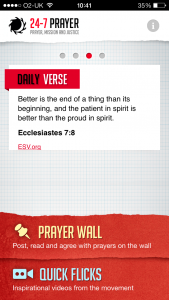
24-7 Daily (iOS and Android; free): Coming from the wonderful people at 24-7 Prayer, the app’s design is instantly recognisable from the website. On opening, you have a nice clean slider in the middle of the page offering a variety of daily content: there is always a quotation, a verse of Scripture (from the ESV), and a short prayer to pray; sometimes there is an announcement from 24-7 and/or a call to prayer. Two links at the bottom of the page offer you a ‘prayer wall,’ where prayers can be written, read, and ‘amened’, and a link to various videos from 24-7. The content is all in the cloud.
The design of this app is very nice: clean, clear, big buttons, obvious navigation. For me, though, the content is inadequate for a daily devotional app; one line of Scripture, one quick quotation, and one short prayer to be read is just not enough meat. For a while I opened it after a longer devotional; I could imagine using it at lunchtime as a quick devotional break, perhaps.
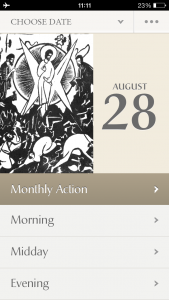 Common Prayer (iOS; £6.99): This is a iOS version of Shane Claiborne and Jonathan Wilson-Hartgrove’s Common Prayer: A Liturgy for Ordinary Radicals. After the opening screen, you get a daily menu, with a picture and links to a ‘monthly action’ and morning, midday, and evening prayer. A top bar allows you to look at the menu for any other day, to pick from a number of ‘occasional prayers’ (‘A Litany to Honor Women’; ‘A Prayer for Adoption’; ‘Before or After a Meal’; ‘Death of Someone Killed in the Neighborhood’; ‘Prayers for a Workplace’; …), and to open a ‘Songbook’ of recordings of 43 hymns, which are mostly traditional and American (‘We are marching in the light of God’ is the even vaguely modern inclusion). The top bar also gives you an impressively-customisable set of notification options; you can be reminded how you want, when you want. The three daily offices are brief, with only the morning office including set Bible readings, which are present as hyperlinks that (if you have a web connection) open Bible Gateway in an in-app browser. The morning office also includes a link to one of the hymns in the songbook, and invites you to listen/join in as part of your prayer.
Common Prayer (iOS; £6.99): This is a iOS version of Shane Claiborne and Jonathan Wilson-Hartgrove’s Common Prayer: A Liturgy for Ordinary Radicals. After the opening screen, you get a daily menu, with a picture and links to a ‘monthly action’ and morning, midday, and evening prayer. A top bar allows you to look at the menu for any other day, to pick from a number of ‘occasional prayers’ (‘A Litany to Honor Women’; ‘A Prayer for Adoption’; ‘Before or After a Meal’; ‘Death of Someone Killed in the Neighborhood’; ‘Prayers for a Workplace’; …), and to open a ‘Songbook’ of recordings of 43 hymns, which are mostly traditional and American (‘We are marching in the light of God’ is the even vaguely modern inclusion). The top bar also gives you an impressively-customisable set of notification options; you can be reminded how you want, when you want. The three daily offices are brief, with only the morning office including set Bible readings, which are present as hyperlinks that (if you have a web connection) open Bible Gateway in an in-app browser. The morning office also includes a link to one of the hymns in the songbook, and invites you to listen/join in as part of your prayer.
The design here is nice and clean, and excellently customisable (brightness; size of text; …). The link out to Bible Gateway is a bit of a jarring change aesthetically, and also does not always work perfectly (readings that cross chapters are a mess, in particular). Going to Bible Gateway does allow you to choose your preferred version to read, however. This is the only app that includes hymnody; however, the selection is very limited and the style uniform – why not allow users to add links to their own music libraries, given we’re on a smartphone? Other than the need to link to Bible Gateway, all the data is stored locally, and so accessible without a web connection.
The liturgical content is some distance from any standard office, and users’ view of the app will probably depend largely on the extent to which they appreciate the liturgical decisions. Not unexpectedly, given its authors, the focus is heavily politicised neo-monasticism. The monthly actions are an interesting addition that reinforce this impression – January, ‘Shared Economics’; February, ‘Reconciliation’; … I used this for a while, but fairly quickly found the tone too strident, but, as I say this is a matter of taste/spirituality/theology, and so will vary from person to person. (I was in a non-western city when I finally gave up on it; being repeatedly lectured about the evils of ’empire’ by an American citizen in that context felt deeply inappropriate to me.)
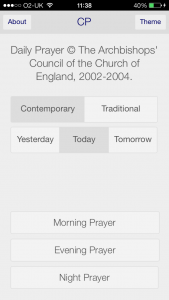 CP: A browser for the Church of England Daily Prayer feed (iOS; free): This does what it says on the tin, offering you a dedicated browser for the CoE Daily Prayer feed. The opening screen offers simple choices between ‘contemporary’ and ‘traditional’ language; the office for yesterday, today, or tomorrow; and morning, evening, or night prayer. There is also a small button offering a choice of three theme colours and three text sizes. The office itself scrolls on a single page and includes the first-choice canticles and Bible readings (from NRSV); alternative Bible readings are hyperlinked, taking you out of the app and into your web browser; alternative canticles appear hyperlinked, but the links do nothing.
CP: A browser for the Church of England Daily Prayer feed (iOS; free): This does what it says on the tin, offering you a dedicated browser for the CoE Daily Prayer feed. The opening screen offers simple choices between ‘contemporary’ and ‘traditional’ language; the office for yesterday, today, or tomorrow; and morning, evening, or night prayer. There is also a small button offering a choice of three theme colours and three text sizes. The office itself scrolls on a single page and includes the first-choice canticles and Bible readings (from NRSV); alternative Bible readings are hyperlinked, taking you out of the app and into your web browser; alternative canticles appear hyperlinked, but the links do nothing.
The opening page design is clean to the point of minimalism; the office itself scattered with the usual signs in the canticles – black dots; ‘R’s for the refrain (which you have to scroll up or down to find – something I found surprisingly disruptive/annoying) – but otherwise nice enough. As the name suggests, all the content is in the cloud. If you want to pray Common Prayer, this will work fine for you; unless you have that commitment, I would suggest that the Mission St Clare Daily Office (see below) gives you a very similar office in a better implementation.
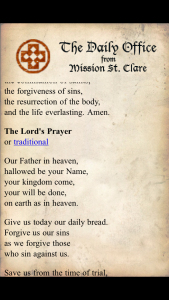 Mission St Clare (iOS & Android; free): The Mission St Clare website is a venerable supplier of daily offices online, and offers audio, downloads of a month’s office at a time to ebook readers, offices in several languages, and so on. The app offers the ECUSA Book of Common Prayer office, together with a number of proposed prayers for various situations, and short essays (all I think by James Kiefer) on those commemorated on particular days. The content is all pulled from the cloud. The app has a parchment background, with a menu screen offering morning and evening prayer in English and Spanish, for today, yesterday, and tomorrow but no further. Readings are in-app, generally from the NRSV (psalms and the Lord’s prayer have a hyperlinked option to ‘traditional language’ or the Coverdale psalter).
Mission St Clare (iOS & Android; free): The Mission St Clare website is a venerable supplier of daily offices online, and offers audio, downloads of a month’s office at a time to ebook readers, offices in several languages, and so on. The app offers the ECUSA Book of Common Prayer office, together with a number of proposed prayers for various situations, and short essays (all I think by James Kiefer) on those commemorated on particular days. The content is all pulled from the cloud. The app has a parchment background, with a menu screen offering morning and evening prayer in English and Spanish, for today, yesterday, and tomorrow but no further. Readings are in-app, generally from the NRSV (psalms and the Lord’s prayer have a hyperlinked option to ‘traditional language’ or the Coverdale psalter).
The design here is nice: the parchment background does not scroll with the text, which is slightly odd (it has one dark mark that I repeatedly mistake for a bit of dirt on my screen…). The header also remains fixed, and is on the same background as the scrolling window, which is an odd design feature. The office is traditional in format and modern in language; the commemorative essays and suggested prayers a nice feature that I generally do not use. This is the office I presently keep returning to using after trying one or another of the others.
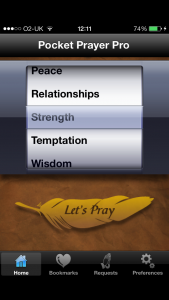 Pocket Prayer Pro Lite and Full (iOS; free/£1.49): This is not an office; rather it offers two things: a collection of prayers to pray, grouped under categories (‘joy’; ‘nation’; ‘work’), and a journal for keeping a prayer list. It opens to a home screen with a scroll feature for the set prayers, and a menu bar at the bottom offering links to prayers you have bookmarked, to the prayer journal feature, and to a preferences screen, offering a fair amount of customisation (including a choice between two Bible versions: KJV & NIV).
Pocket Prayer Pro Lite and Full (iOS; free/£1.49): This is not an office; rather it offers two things: a collection of prayers to pray, grouped under categories (‘joy’; ‘nation’; ‘work’), and a journal for keeping a prayer list. It opens to a home screen with a scroll feature for the set prayers, and a menu bar at the bottom offering links to prayers you have bookmarked, to the prayer journal feature, and to a preferences screen, offering a fair amount of customisation (including a choice between two Bible versions: KJV & NIV).
The design is nice enough – rather more fonts happening around the place than seems necessary, but otherwise fine. Each set prayer is followed by a text of Scripture under the heading ‘God’s promise’. The prayer journal feature allows photos to be attached to requests, which is an obvious, but welcome, feature to include, and allows you to schedule prayers (so if you promise to pray for someone’s job interview next Wed, you get a reminder.) I don’t find written intercessions particularly helpful, and so don’t make much use of this app; for someone who does, it contains a wide selection of such prayers. The journal section is well-constructed, and offers useful backup options.
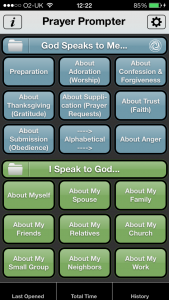 Prayer Prompter (iOS; free): This is not quite an office, but could be used to construct one. The home screen is split in half, the upper half giving a series of buttons under the title ‘God speaks to me’ and the lower half giving a similar series under the title ‘I speak to God’. Each button takes you to a Bible verse, or a prayer, which you can read/meditate on/pray. The app offers you ‘mix modes’ which construct a series of entries in a given order, offering you almost a custom office. All the content is editable, and stored locally on your device (there is a backup option).
Prayer Prompter (iOS; free): This is not quite an office, but could be used to construct one. The home screen is split in half, the upper half giving a series of buttons under the title ‘God speaks to me’ and the lower half giving a similar series under the title ‘I speak to God’. Each button takes you to a Bible verse, or a prayer, which you can read/meditate on/pray. The app offers you ‘mix modes’ which construct a series of entries in a given order, offering you almost a custom office. All the content is editable, and stored locally on your device (there is a backup option).
I love the concept of this app – I can imagine it being something very powerful because very personal. The execution, however, seems to me to be poor. It comes with some populated entries, largely Bible quotations (KJV), but to make it something personally useful, I would have to spend considerable time inputting material. I suppose the developer thinks users might start using it and populate as they go, but it seems to me it would take a long time doing that to get something genuinely of worth. (And entries cannot be imported, but have to be added via iPhone, which is not ideally suited for inputing large blocks of text.) It comes with very irritating ‘guilt-inducing’ features (some of which can, to be fair, turned off) – app badges telling you how many days you haven’t opened it; in-app counters telling you how many boxes you’ve prayed today, and how long you’ve spent praying, and so on. Also, trivially perhaps, the app has, seriously, the single worst icon in the whole app store…
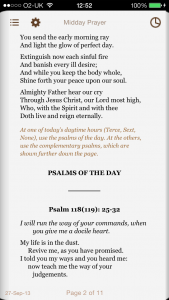 Universalis (iOS & Android; £9.99): This app gives you all the services of the Roman Catholic divine office: daily mass; lauds; terce; sext; none; vespers; compline; and the office of readings. There are a multitude of options including a choice of Bible versions (Jerusalem Bible or NAB); different sets of psalms; some different language material; the inclusion or exclusion of invitatory psalms, &c., &c. There is an option to read long hours as a continuous scroll or by flicking virtual pages in a book. All the material is stored locally. It essentially reproduces the material on the Universalis web site, however.
Universalis (iOS & Android; £9.99): This app gives you all the services of the Roman Catholic divine office: daily mass; lauds; terce; sext; none; vespers; compline; and the office of readings. There are a multitude of options including a choice of Bible versions (Jerusalem Bible or NAB); different sets of psalms; some different language material; the inclusion or exclusion of invitatory psalms, &c., &c. There is an option to read long hours as a continuous scroll or by flicking virtual pages in a book. All the material is stored locally. It essentially reproduces the material on the Universalis web site, however.
The app is very nicely designed, and very customisable. It is by some distance the best of the apps on this list, and before the Mission St Clare app came along I used it regularly. But… I’m not Catholic, and it is… In particular, I found myself editing out invocations of the Saints, and particularly of the Blessed Virgin, on a regular basis. If you are Catholic, I should say that I have been told by one Dominican friend that the Universalis translations of parts of the office are so free as to be potentially unusable for someone with an obligation to say the Office (something they more or less acknowledge on the website FAQ page, to be fair).
* * *
UPDATE: Kevin Navarro on FB pointed me also to iPray BCP, which I have not used, and which offers traditional 1662 Book of Common Prayer morning and evening prayer, and midday prayer and compline from a 1962 Canadian liturgy.



Recent Comments